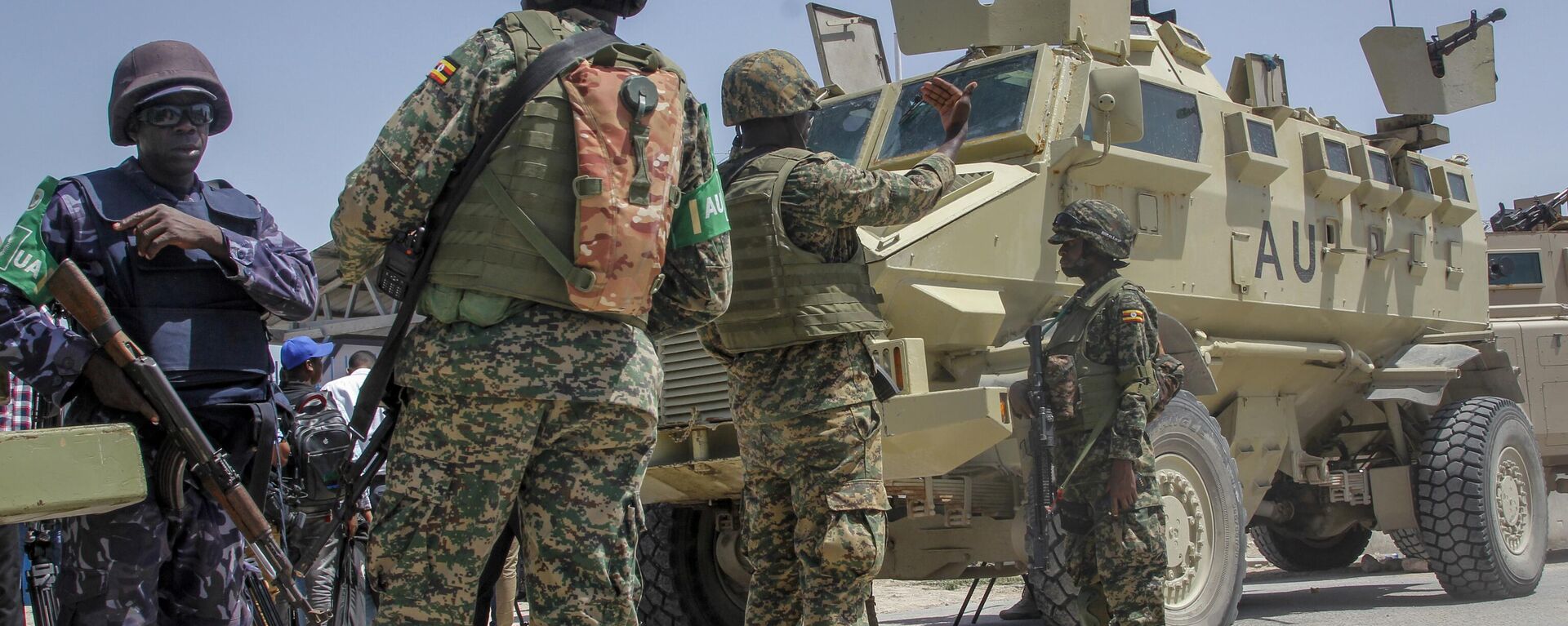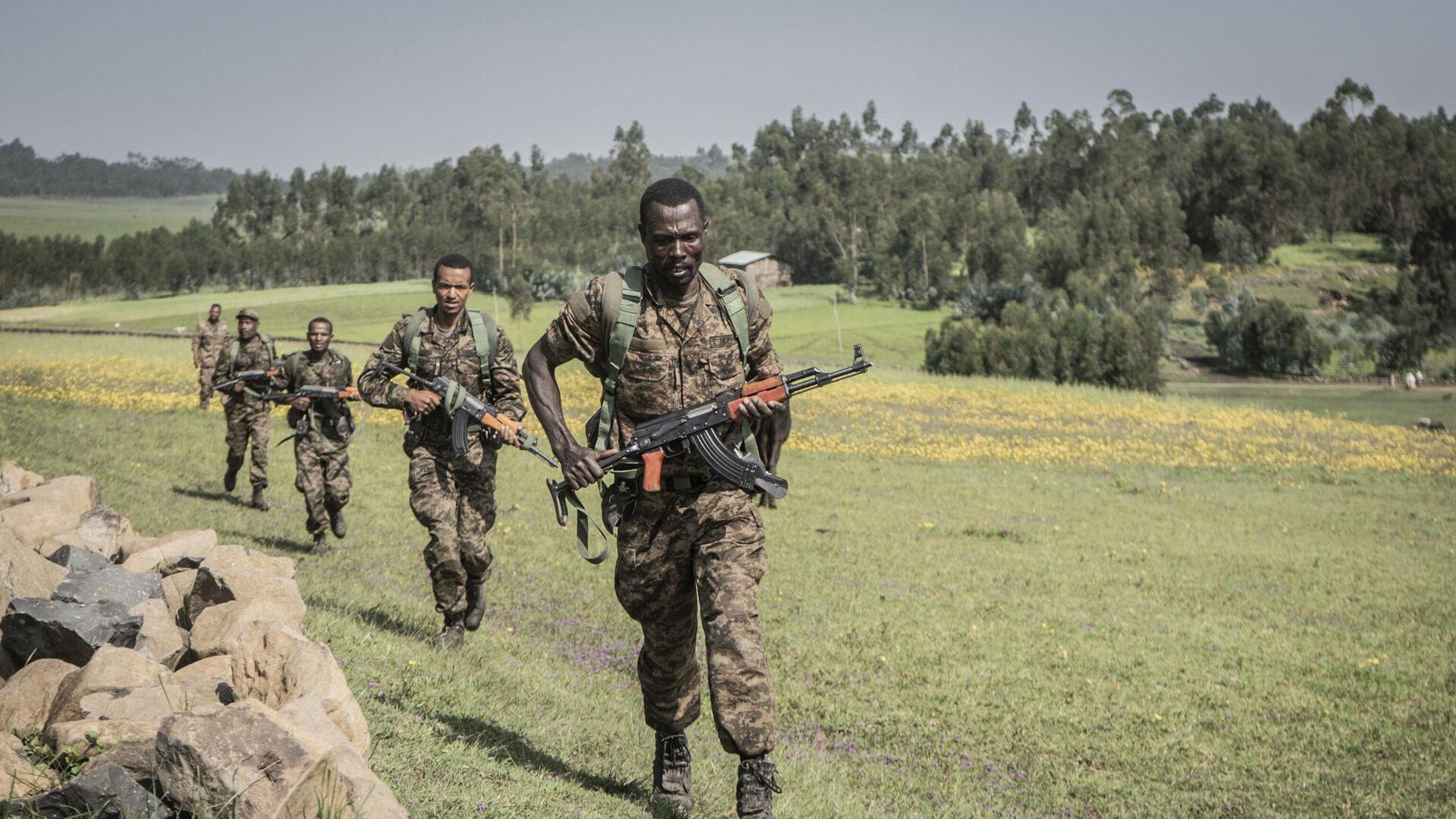https://sputnikglobe.com/20221128/ethiopian-djiboutian-atmis-peacekeepers-conduct-joint-military-exercise-1104791426.html
Ethiopian, Djiboutian ATMIS Peacekeepers Conduct Joint Military Exercise
Ethiopian, Djiboutian ATMIS Peacekeepers Conduct Joint Military Exercise
Sputnik International
This article is about recent joint military drill conducted by Ethiopian and Djiboutian peacekeeping forces under the African Transition Mission in Somalia (ATMIS).
2022-11-28T17:31+0000
2022-11-28T17:31+0000
2022-11-28T17:31+0000
africa
east africa
somalia
horn of africa
african union transition mission in somalia (atmis)
peacekeeping forces
https://cdn1.img.sputnikglobe.com/img/07e6/0b/1c/1104790423_0:0:3073:1728_1920x0_80_0_0_c6d5ff98b438d9c7e5f4f33894aa6648.jpg
Ethiopian and Djiboutian peacekeeping forces under African Transition Mission in Somalia (ATMIS) Sector Four have conducted a joint military drill, according to Ethiopian media. The joint military exercise by the members of ATMIS peacekeeping forces from Ethiopia and Djibouti is of crucial importance in terms of anticipating future challenges and undertaking possible missions in a coordinated manner, said Deputy Commander of Sector Four Colonel Shumet Telelew, as cited by the media. According to the commander, the joint military drill is expected to help eliminate Al-Shabaab’s occasional attempted attacks, and enhance the alliance of the two countries’ armed forces. It was mentioned that the military exercise will help assess the current military capacity of their forces. After the military drill, the peacekeeping mission members stated that the joint combat exercise based on practice is aimed not only at checking the military’s position, but also at strengthening the coordination within the forces to subsequently neutralize the al-Shabaab terrorist group. The announcement of the joint military drill follows the latest attack by Al-Shabaab militants in Mogadishu, the capital of Somalia, at the Villa Rossa hotel located in a secure area near the presidential residence on November 27. The attack resulted in at least four casualties, according to media reports, citing a local security official. Amid intensified attacks by the terrorist group, the African Union Peace and Security Council recently extended the operational timelines of the organization's Transition Mission in Somalia. ATMIS is a multidimensional mission authorized by the AU and mandated by the United Nations Security Council. The countries contributing troops include Uganda, Burundi, Kenya, Ethiopia, and Djibouti. ATMIS forces have a mandate to carry out joint operations with the Somali Security Forces (SSF) against Al-Shabaab and other terrorist groups, provide security and protection for local communities, and increase the capacity of the SSF to enable them to take over the security responsibility after the end of the transition period in December 2024. *Terrorist organizations outlawed in Russia and many other states
https://sputnikglobe.com/20221125/african-union-extends-atmis-troops-presence-in-somalia-in-wake-of-resurgence-of-al-shabaab-attacks-1104677854.html
africa
east africa
somalia
horn of africa
Sputnik International
feedback@sputniknews.com
+74956456601
MIA „Rossiya Segodnya“
2022
News
en_EN
Sputnik International
feedback@sputniknews.com
+74956456601
MIA „Rossiya Segodnya“
Sputnik International
feedback@sputniknews.com
+74956456601
MIA „Rossiya Segodnya“
africa, east africa, horn of africa, african transition mission in somalia (atmis), peacekeeping operations
africa, east africa, horn of africa, african transition mission in somalia (atmis), peacekeeping operations
Ethiopian, Djiboutian ATMIS Peacekeepers Conduct Joint Military Exercise
In light of a recent resurgence of terrorist attacks by Al-Shabaab* in Somalia, the African Union (AU) and neighboring countries are set to enhance the operational effectiveness of the peacekeeping forces stationed in the country in order to anticipate and eliminate potential terror threats.
Ethiopian and Djiboutian peacekeeping forces under African Transition Mission in Somalia (ATMIS) Sector Four have conducted a joint military drill, according to Ethiopian media.
The joint military exercise by the members of ATMIS peacekeeping forces from Ethiopia and Djibouti is of crucial importance in terms of anticipating future challenges and undertaking possible missions in a coordinated manner, said Deputy Commander of Sector Four Colonel Shumet Telelew, as cited by the media.
According to the commander, the joint military drill is expected to help eliminate Al-Shabaab’s occasional attempted attacks, and enhance the alliance of the two countries’ armed forces. It was mentioned that the military exercise will help assess the current military capacity of their forces.
After the military drill, the peacekeeping mission members stated that the joint combat exercise based on practice is aimed not only at checking the military’s position, but also at strengthening the coordination within the forces to subsequently neutralize the al-Shabaab terrorist group.
The announcement of the joint military drill follows the latest
attack by Al-Shabaab militants in Mogadishu, the capital of Somalia, at the Villa Rossa hotel located in a secure area near the presidential residence on November 27. The attack resulted in at least four casualties, according to media reports, citing a local security official.
Amid intensified attacks by the terrorist group, the African Union Peace and Security Council recently
extended the operational timelines of the organization's Transition Mission in Somalia. ATMIS is a multidimensional
mission authorized by the AU and mandated by the United Nations Security Council. The countries contributing troops include Uganda, Burundi, Kenya, Ethiopia, and Djibouti.

25 November 2022, 12:17 GMT
ATMIS forces have a mandate to carry out joint operations with the Somali Security Forces (SSF) against Al-Shabaab and other terrorist groups, provide security and protection for local communities, and increase the capacity of the SSF to enable them to take over the security responsibility after the end of the transition period in December 2024.
*Terrorist organizations outlawed in Russia and many other states



